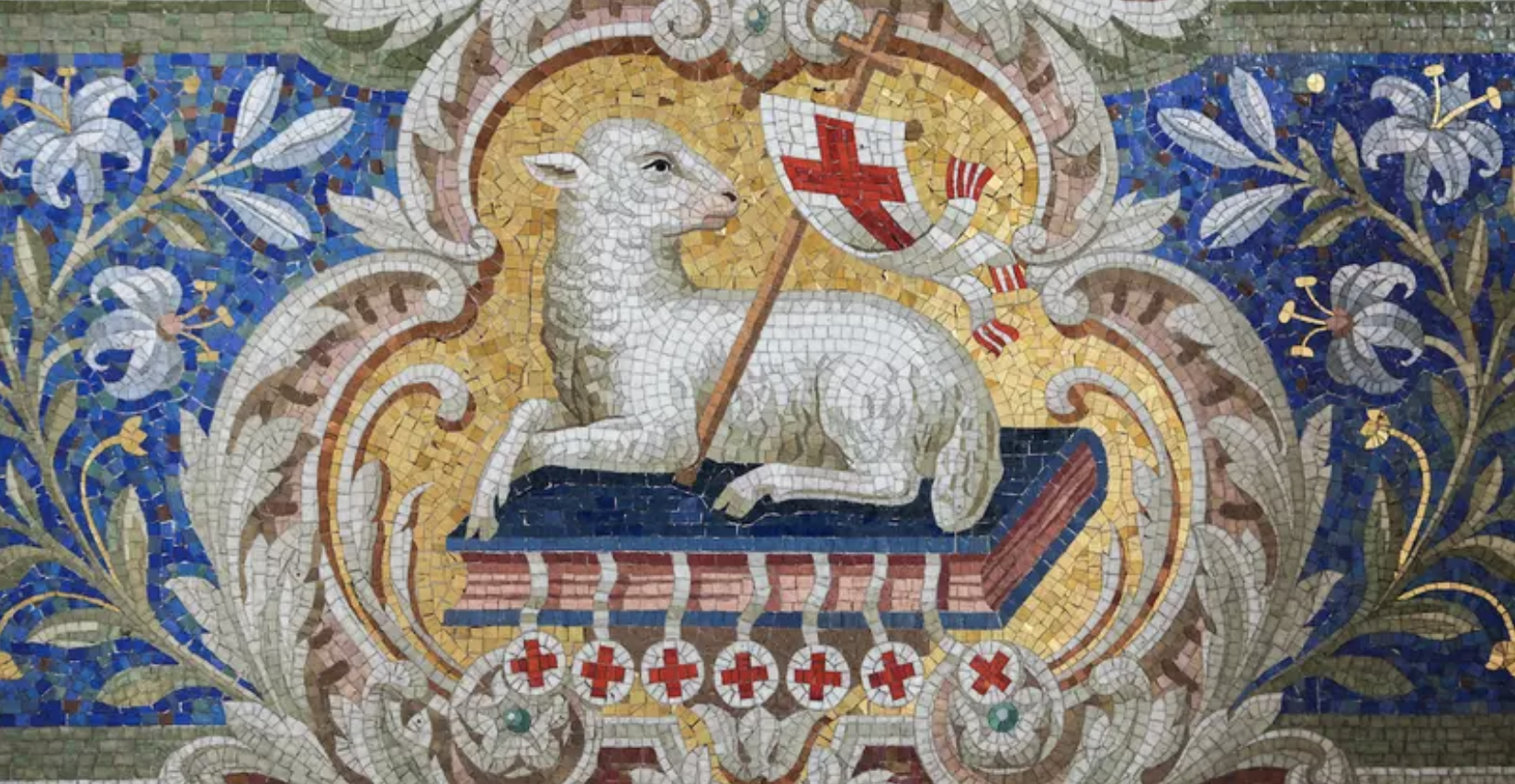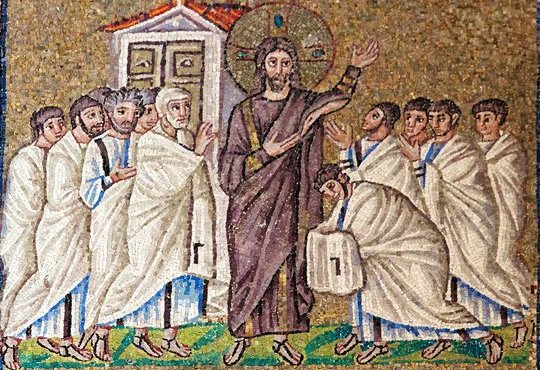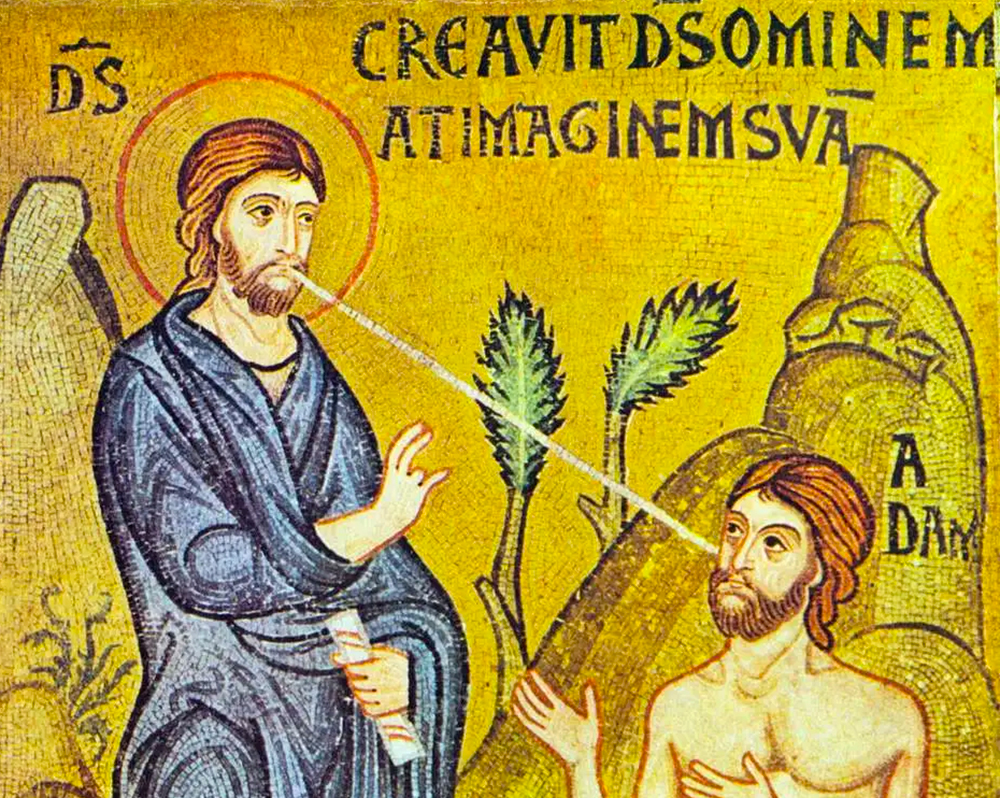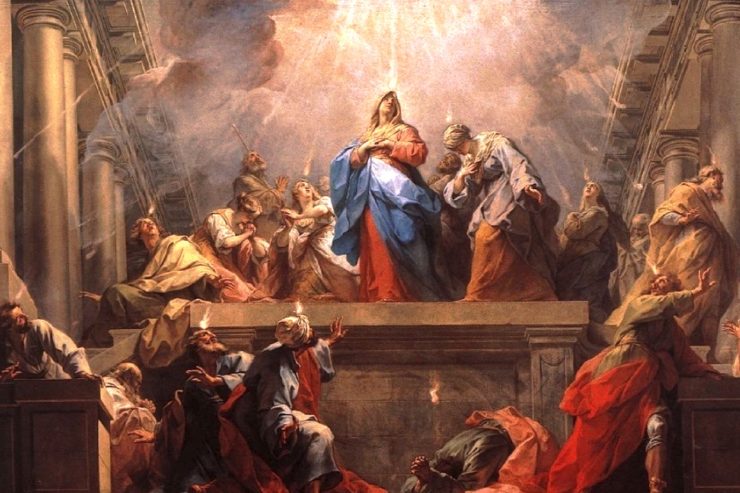 When he sees Jesus Himself,
He responds by surpassing the others in faithfulness
making
the highest claim found anywhere in Holy Scripture for Jesus' Divinity:
When he sees Jesus Himself,
He responds by surpassing the others in faithfulness
making
the highest claim found anywhere in Holy Scripture for Jesus' Divinity:

On St. Thomas Sunday,
we remember Jesus' boldest Disciple.
We recall once again
the division and conflict among the Master's followers
as they contemplated danger in Jerusalem.
They are alarmed
as Jesus declares that He will return to Judea
(Jn 11:8).
"Judea?!"
they think.
"Surely, we will all be killed!"
They approach Jesus diplomatically:
|
The disciples said to Him, "Rabbi, lately the Jews sought to stone You,
and are You going there again?" (Jn 11:8) |
Let us notice here that Judeans and Jews are equivalent terms. They represent the first-century inhabitants of the historical tribe of Judah, who have accepted Mesopotamian modifications to Hebrew religion. By contrast, Jesus and His Disciples were reared in the other historical tribal districts. Patently, there are no Jews to fear where they presently are as we rehearse a conversation from John 11:8. "Let us not leave here where it is safe!," they, in effect, plead. Nor are there Jews to be feared in Samaria or in Galilee or really anywhere north of Jerusalem.
Judah-ism is what it sounds like: the religion of Judah, emplanted in Palestine by Mesopotamian overloads as twenty-first-century scholarship has shown. That is, Jesus and His followers represent Hebrew traditionalism set against foreign idolatry. (This is very important.) The Master has pushed back against the dominant power within the historical Twelve Tribes of Israel, whom He has been sent to save. The power brokers within the collaborator tribe, Judah, are not happy as the validity of their religion and lifeworld are publicly questioned. They are past debating about Jesus. They now plan to kill Him.
It is Thomas alone who rejects the fearfulness of the others:
| "Let us also go, that we may die with Him!" |
Last week, we reflected on the friendship between Damon and Pythias and what that relationship meant to the whole ancient world. St. Luke said, "We sail under the banner of the twins of Syracuse!" Thomas is making a Damon-Pythias statement: "If he is to die, then I will die with him!"
The narrative continues, now playing out in the Upper Room following the Master's Crucifixion, and we find Thomas still alienated from the others. Unlike his timid brethren, he goes boldly into the streets of Jerusalem while they cower behind a locked door. And we do not stretch to imagine that the temper and opinions of this group are distasteful to him. He has no interest in anything they have to say. Small wonder that he dismisses out of hand claims which sound like the fabrications of fearful and overheated imagination.
 When he sees Jesus Himself,
He responds by surpassing the others in faithfulness
making
the highest claim found anywhere in Holy Scripture for Jesus' Divinity:
When he sees Jesus Himself,
He responds by surpassing the others in faithfulness
making
the highest claim found anywhere in Holy Scripture for Jesus' Divinity:
| And Thomas answered and said to Him, "My Lord and my God!" (Jn 20:28) |
The Greek words are
|
`Ο κύριός μου και `ο Θεός μου.
`O kúriós mou kai `o Theós mou. |
Kurios .... Theos: titles reserved for YHWH in the Septuagint.
Our King and our God. This most certainly is no common blood sacrifice offered for the people — a most repugnant concept, which Jesus deplored as a most offensive artifact of Mesopotamian belief. For animal sacrifice debases the worship of God reducing it to idolatry.
Believing that Jesus died on a cross for our salvation as substitutionary sacrifice is a notion that stinks in the nostrils of Heaven. Jesus has saved us through and with and in His Life. His death serves to prove to the unbelieving what has already been true all along:
|
"The ox knows its owner
And the donkey its master's crib; But Israel does not know," Says the Lord .... "I have had enough of burnt offerings of rams And the fat of fed cattle. I do not delight in the blood of bulls, Or of lambs or goats. "When you come to appear before Me, Who has required this from your hand, To trample My courts? Bring no more futile sacrifices; Incense is an abomination to Me. The New Moons, the Sabbaths, and the calling of assemblies — I cannot endure iniquity and the sacred meeting. Your New Moons and your appointed feasts My soul hates; They are a trouble to Me, I am weary of bearing them. When you spread out your hands, I will hide Mine eyes from you; Even though you make many prayers, I will not hear. Your hands are full of blood. "Wash yourselves, make yourselves clean; Put away the evil of your doings from before My eyes. Cease to do evil, Learn to do good; Seek justice, Rebuke the oppressor; Defend the fatherless, Plead for the widow. (Isa 1:3-17) |
This is how the great Scroll of Isaiah opens, recording that Mesopotamian and Canaanite idolatry was already infiltrating into Hebrew culture on the eve of the Exile. What is being displayed here so prominently in this most prominent prophet: the pure, ancient Hebrew religion of transformation and compassion supplanted by blood sacrifice. Here is the Scroll of Isaiah read by Jesus in the synagogue. Here is the Christian religion.
From His birth in a barnyard stable to His gathering a Hebrew traditionalist brotherhood to His riotous demonstrations against animal sacrifice in the Zion Temple to His teachings arising from the ancient Hebrew religion concerning communion with God .... here is Christianity.
And God's Son, appearing before descendents of the ancient Hebrews (the Habiru laborers who languished in Egypt, according to the historical record), here standing before them is the Lamb of God. He is the Lamb venerated by St. John the Baptist in the presence of his own disciples. The man of Eden, a vegetarian who also deplored animal sacrifice, was not worthy, he said, to unloose a strap of the Lamb's sandals (Jn 1:27).
He is the Lamb upon His Throne lauded and honored by St. John the Divine. He has banished animal sacrifice by instituting His Body and His Blood as a living communion, a mutual indwelling of God and man. His Royal Blood courses through our veins as His Co-heirs and Inheritors. As the Troparia of the Early Church record, these bloodlines point back allegorically to the Habiru of Egypt, where the Angel of Death passed over households bearing the royal insignia .... of the Lamb. The Passover of Christ continues, not as blood sacrifice, but as a living and eternal communion, which death cannot touch.
In an unexpected irony, The Lamb will shepherd the lost sheep:
|
He will feed His flock like a shepherd; He will gather the lambs with His
arm, And carry them in His bosom, And gently lead those who are with young. (Isa 40:11) |
He is one with them, yet He is not one of them. His wool is whiter than any fuller could achieve, for it has never turned dusky from the filth of the world.
He is the Servant of all, even the Suffering Servant,
|
He was oppressed and He was afflicted, Yet He opened not His mouth;
He was led as a lamb to the slaughter, And as a sheep before its shearers is silent, So He opened not His mouth. (Isa 53:7) |
Yet He is always already first of all, even the Beginning and the End (Rev 1:8)

He is the Divine Logos
Who breathed the living spiritus into Adam and
then later,
at His Incarnation,
reinvigorated the Creation He made with that same Divine Power.
And now
He stands before the Disciples in the quiet of a locked room.
Recently laid in a tomb,
the context unavoidably is death,
revealing a greatest fact:
He is the Lord of Life.
In this Empyreal Dignity, with this Royal Bearing, reprising the second chapter of Genesis, He breathes on them saying, "Receive the Holy Spirit" (Jn 20:21). And,
|
"If you forgive the sins of any, they are forgiven them;
if you retain the sins of any, they are retained." (Jn 20:23) |
He stands before us at this high point of the Advent of God, and He founds His Church, investing the sacraments upon the Apostles. You see, He had chosen twelve kings to sit on twelve thrones (Mt 19:28), and today they discover a coronation different from the one they expected (Mk 10:37). They have become Royalty in a Kingdom not of this world (Jn 18:36).
That baptism and reconciliation have been conferred is beyond debate. As Jesus baptizes with the Holy Spirit (Mt 3:11), we are witnessing the first Christian baptisms in salvation history. As the Apostles are granted the power to loose and bind sins on earth as it is in Heaven, reconciliation is also instituted explicitly.
How remarkable! Permit me to ask the Sisters .... if an angel of God announced before you, Sr. Mary Ann and Sr. Mary Martha, and asked you, "When the Church is founded, which sacraments should be the cornerstones, the building blocks upon which everything else may stand, ..... what would you say? Which must come first?
With initiation and reconciliation being established, Christian life begins. Christian life resides in theosis — the long journey whose first step is faith and then completes by emulating the Master to the point of unity: becoming One as He and the Father are One (Jn 17:11).
Jesus consecrates all of this with the sacrament we call illumination: baptism and chrismation. His prayer is that the illuminated will remain faithful .... after being cleansed of every sin. But for those of us who stumble, who fall back into our worldly ways, He has in the same breath instituted re-baptism, which we call reconciliation: confessing our sins to a priest and receiving absolution, being washed clean again. Is not this the foundation of Christian life? If purification is the point of Christian life, which other sacraments would we choose to be first?
Other mysteries of the Church are implied. Obviously, holy orders are bestowed as we witness the ordination of the Church's first bishops. Eucharist is implied by their communion with the living Body and Blood of the Lord Jesus, now Present to them. As the Bridegroom is present with His Groomsmen (Mk 2:19), matrimony is also implied. And which coronation of a king lacks unction? You see, anointing is also implied.
Amidst the reverent silence of the Apostles, Jesus founds the One Holy Catholic and Apostolic Church. These men will carry her Holy Mysteries, invested within them, all over the known world. The bold Disciple Thomas, "Apostle to Asia," will journey farther than all of them, establishing the Church along the Malabar Coast of India and thence to China.
Attesting the Apostolic power to ordain, holy orders are conferred upon St. Paul, who will become the "Apostle to Europe," that stepping stone to the New World.
Where these man are, there is the Church., wrote St. Ignatius of Antioch (Letter to the Smyrnaeans). And I give thanks that next Sunday, I will be standing in this pulpit offering a reflection. I will sitting with the Sisters, for the Church will be present in the person of His Beatitude, Metropolitan Jonah.
The Church is no abstraction. It is a visible, organic Kingdom .... of this world, yet not of this world. It is a living, breathing Body composed of biological cells, yours and mine. These cells embody the Kingdom of God on earth. And that is reason enough for the Master's sufferings .... and ours, for the trueness of Heaven can never square with a twisted and disjointed world. Whenever the Church tries to be "relevant," attempting to conform itself to culture, degradation must always follow. Small surprise.
From time to time, surgery is required to remove cells who love the world more than they love God as St. Paul suggests in the opening chapters of His letter to the Church at Ephesus and St. John teaches in His Letters. Yes, of course, we must reach out to our wayward brothers and sisters in Christ .... repeatedly.
|
"If they still refuse to listen, tell it to the Church; and if they refuse
to listen even to the Church, treat them as you would a pagan or a tax collector." (Mt 18:17) |
Whose words are these? These are the words of our King and our God — the infallible instructions of the Master, which cannot be abridged. Otherwise, the whole body is endangered. And what could be more grotesque in the wide world than the Church falling into worldliness and depravity?
We grieve to see our children falling into a depraved state. We grieve to see once wholesome families falling into brokenness. But what could be more devilish than the Church fallings into worldliness and depravity?
Jesus founds His Church. And He has amply supplied us with all that we need to advance towards His marvelous Heaven, which turns out to be family, sharing the same noble Blood, bearing the same royal Resemblance, with older brothers and sisters showing the way to younger siblings, who together serve a broken and hurting world, yet always being set apart from the world, protecting its integrity and distinctive godliness.
As a young minister and then priest, I was constantly endangering my ministry by bringing the hurting and broken quite literally into my life. It would be during my sojourn in Haiti where my religious superior, Sr. Mary Ann, taught me that a wall must be built around the heart of the ministry. Yes, we go out into the world every day pouring ourselves out at the feet of the afflicted and the oppressed, but at the end of each day we must retreat to our prayers and to our restoration.
 I cannot imagine a more perfect way for the Lord to have founded His Church,
surrounded by the reverent silence of the Apostles.
St. John's accounts truly depicts a perfection.
How different it is from the account we find in the Holy Gospel According to St. Luke!
St. Luke sets out an elaborate stage set
(anticipating grand opera by fifteen centuries).
Arias are sung
by Zachariah (the Benedictus),
by the Theotokos (the Magnificat),
by St. Simeon (the Nunc Dimittus),
and
by St. Peter at Pentecost addressing,
it seems,
all humanity who seem to have gathered in the public squares of Jerusalem:
Parthians, Medes and Elamites;
residents of Mesopotamia, Judea and Cappadocia,
Pontus and Asia, Phrygia and Pamphylia, Egypt and the parts of Libya near Cyrene;
visitors from Rome (both Jews and converts to Judaism);
Cretans and Arabs" (Acts 2:9-11).
The Holy Spirit is seen to alight upon every living human creature,
directly.
I cannot imagine a more perfect way for the Lord to have founded His Church,
surrounded by the reverent silence of the Apostles.
St. John's accounts truly depicts a perfection.
How different it is from the account we find in the Holy Gospel According to St. Luke!
St. Luke sets out an elaborate stage set
(anticipating grand opera by fifteen centuries).
Arias are sung
by Zachariah (the Benedictus),
by the Theotokos (the Magnificat),
by St. Simeon (the Nunc Dimittus),
and
by St. Peter at Pentecost addressing,
it seems,
all humanity who seem to have gathered in the public squares of Jerusalem:
Parthians, Medes and Elamites;
residents of Mesopotamia, Judea and Cappadocia,
Pontus and Asia, Phrygia and Pamphylia, Egypt and the parts of Libya near Cyrene;
visitors from Rome (both Jews and converts to Judaism);
Cretans and Arabs" (Acts 2:9-11).
The Holy Spirit is seen to alight upon every living human creature,
directly.
Remember, the Gospel of St. John is written perhaps two generations after the Gospel According to St. Luke. St. John the Theologian would have known St. Luke's account of Pentecost very well. He would have seen, like us, that while hierarchy is discernible in St. Luke's narrative — the Apostles are gathered; the Mother of God presides over them in their several ranks of honor — the overall effect of St. Luke's description is to point outward to a wide world in which each person is a direct and unmediated recipient of the Holy Spirit .... as Walter Cardinal Kasper, theological advisor to Pope Francis, has argued (Leadership in the Church, 2003).
Do see these two models? The first presents a Kingdom presided over by a King. The other looks more like a democracy.
Here is one among many instances supporting Eugenia Scarvelis Constantinou's statement (Thinking Orthodox, 2020) that Roman Catholics and Protestants have much more to do with each other than either of them has to do with Holy Orthodoxy (referring to Cardinal Kasper). The other leading conviction shared by Roman Catholics and Protestants, but not by Orthodox, is that salvation if effected by the Crucifixion .... not an Orthodox belief.
St. John understands very well the sequence of Cosmic events that have unfolded. Through His death, the Lord has evinced His Divine Identity, which has been true all along, unto the unbelieving and unfaithful. As the Risen Christ, He will make plain to the Twelve what He had taught in parables and riddles. In presenting His Body to them just it had been, He schools them in theosis: both soul and body are sacred, temples for the Holy Spirit, set apart for God, purified and then worthy to be filled with Divine Energies. This is the acceptable sacrifice, which is fragrant in the courts of Heaven. In the Church Jesus has just founded, purification is the central sacrament. All other Mysteries must gather around and serve this one purpose: first baptism and then re-baptism .... as many as may be required that we not lose our part in Him.
"If I cannot wash you," He says, "head and foot, then you can have no part in me" (Jn 13:8). Peter replies, "Then pour the whole bucket over my head!"
It is all laid out for us in Isaiah: how He was born in a stable amongst the ox and ass, who alone knew Him to be God; how He suffered as the Servant of all, underestimated and belittled; how He endured the desecration of His Temple with blood sacrifice, which would reduce His magnificent "ransom for many" to idolatry.
And now He stands in the Upper Room, sweeping all of that away as He had swept away a whole Creation before the generation of Noah. Here He is known: the Lord of Life. As in His first Creation, breathing life into Adam, He now breathes that same life into the Apostles, the bishops of the Church, beginning His Creation again for the final time. He will do this through His Church, His final creation.
Purification will be her central sacrament. Everything else is in vain if we be not purified. All the other Mysteries must coalesce around and attend this essence of Christian life and eternal life.
Here is Orthodoxy plain and simple.
This is our glory.
This is our life.
This is all that matters.
For everything else
—
even Divine love,
prayers spoken and heard in freshness and clarity,
and
service to a hurting world
—
will proceed from our transformation through Him and with Him and in Him,
the Lamb upon His Throne.
In the Name of the Father and of the Son and of the Holy Ghost. Amen.